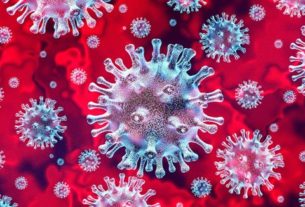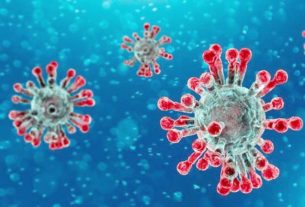From Our Bureau
14TH JUNE 2020
The Corona Virus (COVID-19) pandemic situation remained grim globally, with the confirmed cases across the world soaring to 76,90,708 and the death toll reaching 4,27,630 in the 216 affected countries and territories, according to the latest update from the World Health Organization (WHO).
Globally, American region continued to be the worst-hit with 37,11,768 confirmed cases and 1,99,252 deaths. Europe came next with 23,98,779 confirmed cases and 1,88,001 deaths. Eastern Mediterranean region reported 7,58,551 confirmed cases and 16,640 deaths.
South-East Asia region’s tally stood at 4,55,439 confirmed cases and 12,526 deaths. Western Pacific region recorded 1,97,864 confirmed cases and 7,200 deaths and African region registered 1,67,566 confirmed cases and 3,998 deaths. WHO Risk Assessment at global level remained very high.
World Elder Abuse Awareness Day takes place every year on 15th June as designated by the United Nations General Assembly. It is believed that abuse towards older people has risen significantly during the COVID-19 pandemic. This makes a compelling case for World Elder Abuse Awareness Day’s call for decision-makers to develop universally applicable normative standards for the protection of older people.
Surveillance Update on a cluster of COVID-19 in Beijing, People’s Republic of China
The investigation of a cluster of COVID-19 in Beijing associated with a wholesale market continues. As of 14th June, 16:00 (CEST+6), Chinese authorities reported a total of 77 cases since 11th June, including 2 linked cases in Liaoning Province.
After 56 days of no reported confirmed COVID-19 cases or asymptomatic infections in Beijing, People’s Republic of China, a local case of COVID-19 with no known travel history or contact with a case was reported on 11th June.
WHO published a press release summarizing the event as of 13th June.
From 11-14 June (as of 18:00 CEST+6 14 June), 77 symptomatic laboratory-confirmed cases have been identified related to this cluster in Beijing, including two cases who travelled to Liaoning Province. An additional 46 laboratory confirmed cases, reported without symptoms, have been identified through active screening in the area. The initial symptomatic cases were identified from presentation at six fever clinics and most of the initial cases were linked to the Xinfadi Market in Beijing.
Preliminary investigations continue and as of 14th June, WHO is aware of 40 environmental samples from the Xinfadi market, which have tested positive for SARS-CoV-2 using molecular tests (RT-PCR). Genetic sequencing from humans and environmental samples is ongoing and WHO encourages the release of these sequences as soon as possible. WHO understands that genetic sequences will be released as soon as possible once further laboratory analyses are completed.
Chinese officials have informed WHO of ongoing investigations into the source of the cluster as well as the extent of the current infection among contacts and others who have visited markets in recent weeks.
WHO recommends that thorough investigations continue to better understand the source of the cluster (exploring multiple hypotheses) and the extent of infection.
All identified cases are currently isolated and receiving care, depending on clinical presentation, and contacts of all cases, including those without symptoms, are being followed up and tested.
The public health response by Chinese officials includes: Tracing and monitoring of close contacts of all laboratory conformed cases (regardless of the development of symptoms). Six wholesale food markets in Beijing have fully or partially closed operations. Those working in Xinfadi Market, those living in the surrounding residential compounds, and those who have visited the Xinfadi Market in the preceding weeks are being traced and will undergo testing. Under the Emergency Response framework, some of the local measures that were relaxed had been re-implemented in Beijing. Enhanced screening measures implemented at points of entry.
WHO is closely monitoring the situation and is in close contact with national authorities in China.
WHO Director-General Dr Tedros Adhanom Ghebreyesus, at the media briefing on 12th June, said “ WHO is a global organization, but we are also proud and active members of the cities and 0communities we live in. But although new cases here in Geneva are now in the single digits, we are continuing to see an escalating pandemic globally.”
“As the pandemic accelerates in low- and middle-income countries, WHO is especially concerned about its impact on people who already struggle to access health services – often women, children and adolescents. The indirect effects of COVID-19 on these groups may be greater than the number of deaths due to the virus itself. Because the pandemic has overwhelmed health systems in many places, women may have a heightened risk of dying from complications of pregnancy and childbirth,” he added.
“WHO has developed guidance for health facilities and community activities on maintaining essential services, including for women, newborns, children and adolescents. This includes ensuring women and children can use services with appropriate infection prevention and control measures, and respectful maternal and newborn care. WHO has also carefully investigated the risks of women transmitting COVID-19 to their babies during breastfeeding. We know that children are at relatively low-risk of COVID-19, but are at high risk of numerous other diseases and conditions that breastfeeding prevents.
“Based on the available evidence, WHO’s advice is that the benefits of breastfeeding outweigh any potential risks of transmission of COVID-19. Mothers with suspected or confirmed COVID-19 should be encouraged to initiate and continue breastfeeding and not be separated from their infants, unless the mother is too unwell. WHO has detailed information in our clinical guidance about how to breastfeed safely.
“WHO is also concerned about the impact of the pandemic on adolescents and young people. Early evidence suggests people in their teens and 20s are at greater risk of depression and anxiety, online harassment, physical and sexual violence and unintended pregnancies, while their ability to seek the services they need is reduced. School and university closures can also have a dramatic impact on the ability of adolescents to access preventive services.
“In some countries, more than one-third of adolescents with mental health conditions receive their mental health services exclusively at school. Millions of children who are fed through school meal programmes also have reduced access to food. Limited opportunities for physical activity, and increased use of tobacco, alcohol and drugs may have impacts on the long-term health of these young people.
“To address these challenges, WHO has developed guidelines on maintaining essential services, which we have discussed before. There are also many things people can do to take care of their own health, like staying active, eating a nutritious diet and limiting their alcohol intake. New products, information and technologies are changing how health services are delivered.
“Increasingly, some medicines and tests can be safely obtained over-the-counter at pharmacies, or can be prescribed by doctors online and delivered to people’s homes. WHO has developed guidance on self-care interventions for health which can be rapidly introduced in countries to save and improve lives. For example, providing women and girls with self-injectable contraception can greatly reduce the burden of unintended pregnancies.
“Access to treatment for people living with HIV, and medicines for other health conditions that people can self-manage, can reduce the burden on over-stretched health systems, while meeting the health needs and rights of individuals. Self-care interventions enable more people to obtain the health services they need during the pandemic, when and where they need them. It’s our collective responsibility to ensure these interventions are available and accessible to all people who need them,” the WHO Director-General explained. (eom)


